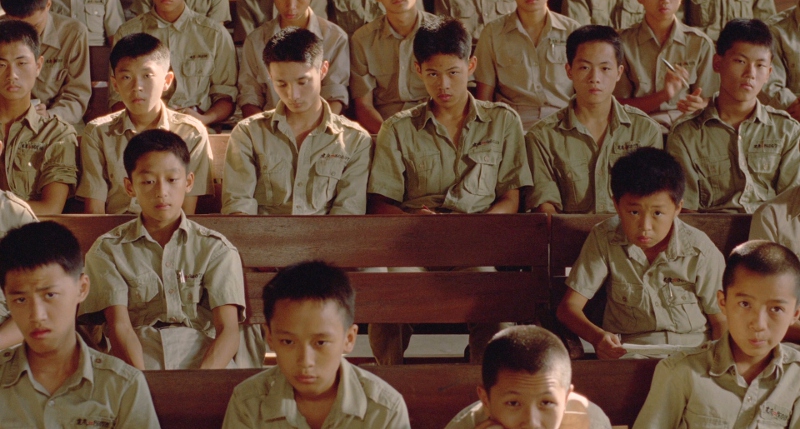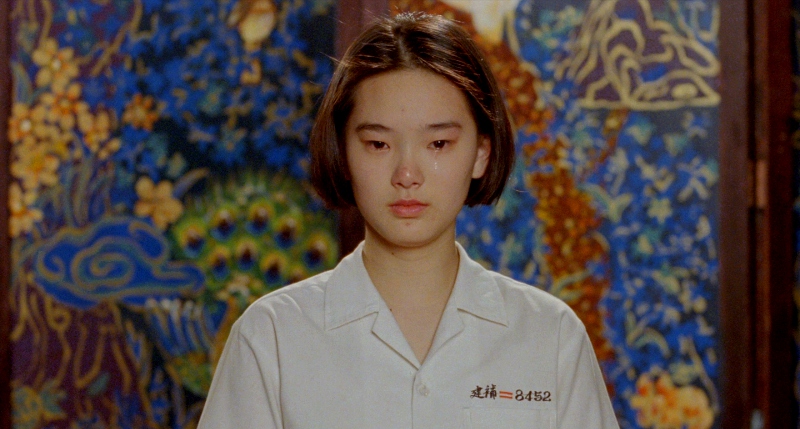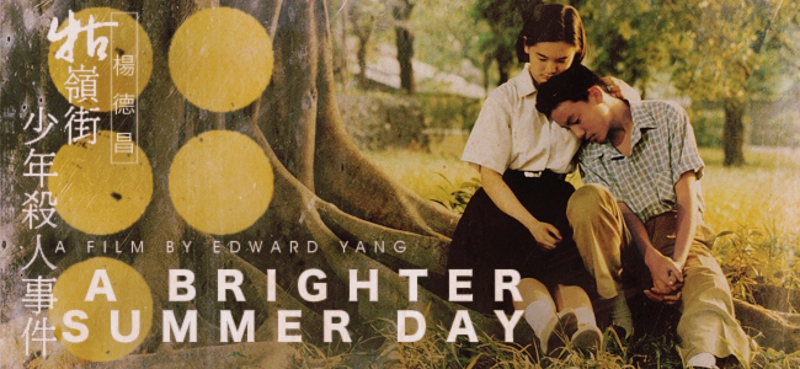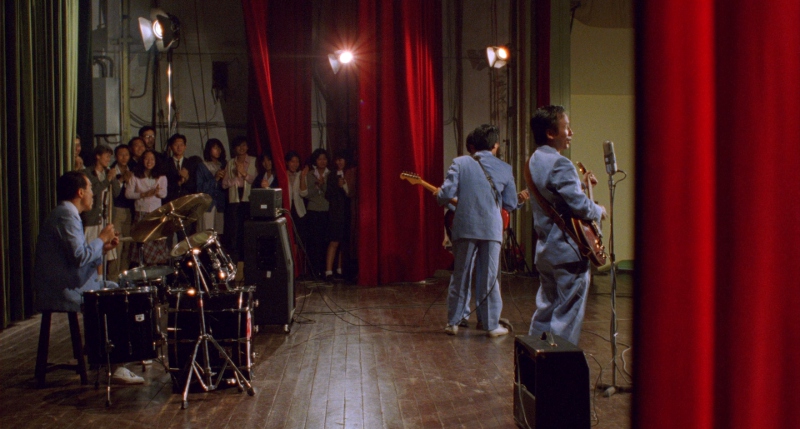| Reviews & Columns |
|
Reviews DVD TV on DVD Blu-ray 4K UHD International DVDs In Theaters Reviews by Studio Video Games Features Collector Series DVDs Easter Egg Database Interviews DVD Talk Radio Feature Articles Columns Anime Talk DVD Savant Horror DVDs The M.O.D. Squad Art House HD Talk Silent DVD
|
DVD Talk Forum |
|
|
| Resources |
|
DVD Price Search Customer Service #'s RCE Info Links |
|
Columns
|
|
|
Brighter Summer Day: Criterion Collection, A
 Through he directed only seven feature-length films before his untimely passing at the age of 59, Edward Yang left a large footprint as part of the New Taiwan Cinema movement during the 1980s and 1990s. Best remembered in North America for his seventh and final production, Yi Yi (2000), Yang's more well-known films are immediately recognizable by their long takes, leisurely pacing, and stories concerned with the passage of time, generation gaps, and ever-changing cultural traditions. His longest and most ambitious effort, 1991's A Brighter Summer Day, has been anticipated by Region 1 fans for years, if not decades: relatively ignored in the West after its original release, it was the recipient of a 2009 4K restoration issued by Martin Scorsese's World Cinema Foundation, with an accompanying theatrical tour and now a Blu-ray from Criterion. If you've waited that long already, what's another seven years? Encompassing a turbulent social period in Taipei circa 1959-61---amplified by the globalization of Western culture during that era---A Brighter Summer Day follows teenager Xiao Si'r (Chang Chen, in his first film role) as he struggles in school and falls in with a street gang. Si'r's relationship with his father (Chang Kuo-chu, Chen's real-life dad), mother (Elaine Jin), and four siblings is strained at times. His new friendship with the flirty Ming (Lisa Yang) doesn't fare all that much better, largely due to her involvement with exiled gang leader Honey (Lin Hung-ming). These two warring groups of teens, known as "The Little Park Boys" and "The 217s", bleed into the foreground and background at will, while the film's later moments focus more on his family's friction with authorities about their former life in mainland China. Loosely based on the first case of juvenile murder in Taiwain's history, A Brighter Summer Day attempts to marry these plot elements in a densely-layered drama filled with no shortage of twists, turns, and barely-controlled chaos. Sprawling in scope, cast, and design (nearly 100 sets were created or used, including an era-specific recreation of Taipei's Guling Street), A Brighter Summer Day's obvious ambitions double as its largest handicap. Any production that demands four hours from its audience has a lot to live up to, and Yang's "lost film" has a bit of trouble holding all the weight it wants to carry. There are no shortage of bright spots, of course: the acting feels perfectly natural---not surprising, since the largely amateur cast was prepped by the director for at least a year---and the set design captures the era in great detail. The story itself has no shortage of highlights, too: Xiao Si'r's unsteady moral compass serves as a solid anchor for the film's chaotic events to revolve around and, even though some of this chaos is self-inflicted, it's tough to take your eyes off the character. But A Brighter Summer Day feels entirely too self-indulgent as a whole: his second-longest feature, the aforementioned Yi Yi, was an hour shorter and balanced the perspective between its characters more smoothly, creating a well-rounded and more effective "epic" than this. Still, A Brighter Summer Day is largely satisfying due to its autobiographical nature and clear ambitions, which are both amplified by its exotic "lost in time" mentality (literally and figuratively, in reference to the film's time period and its relative scarcity during the last 25 years). But I'd be lying if I dashed off a completely agreeable review, because it feels like there's an even more effective story hidden inside this four-hour wall of personal drama, social turbulence, chance encounters, red herrings, broken radios, violent fisticuffs, and American cultural appropriation. Either way, I'd imagine that die-hard fans of the director will enjoy most of what's here...but if viewed years after Yi Yi, it'll probably feel like a half-step backward. Nonetheless, Criterion's long-awaited Blu-ray package is worth its weight in gold, serving up a sparkling A/V presentation and more than a full disc's worth of new and vintage extras.

Presented in its original 1.85:1 aspect ratio, A Brighter Summer Day looks quite good in 1080p. Sourced from a 2009 4K restoration issued by Martin Scorsese's World Cinema Foundation, the film's natural but vivid color schemes look fantastic with excellent detail and plenty of textures. It's a very film-like presentation overall, boasting an obvious grain structure that's free from noise, DNR, and other manipulations. A Brighter Summer Day features no shortage of scenes shot at night or in dimly-lit locales, and most of these hold up nicely with terrific shadow detail and excellent contrast. Given the film's extremely limited status in the United States (and elsewhere) before Criterion's Blu-ray, it's impossible to compare it with any previous discs or an original theatrical showing...but it's obvious that this is an extremely solid transfer that curious new fans will enjoy from start to finish. Although the four-hour film is contained on a single dual-layered disc, there are no obvious signs of poor compression or other such flaws.
Surprisingly, the film's audio is limited to a one-channel DTS-HD Master Audio track; I'll just assume that this represents the original mix, but there are no obvious problems other than the boundaries set by that format. Dialogue is relatively clean and clear throughout; music is generally limited to what's performed on-screen or heard on radios, etc., and these are balanced about as well as expected. I'd imagine that the decision to record A Brighter Summer Day's audio in mono is because of the decade in which it's set, but a bit of background ambiance would have been more than welcome on several occasions. Either way, it gets the job done, so I can't complain all that much overall. Optional English subtitles have been included during the main feature and all foreign language extras.

Disc 2 continues the extras, including a brief but interesting Interview with lead actor Chen Chang (18:45). Recorded in 2014 exclusively for this release, Chen is extremely candid about his disdain for acting prior to his working experience on A Brighter Summer Day. Among other topics, he speaks about the director's approach to working with a largely inexperienced cast, the on-set experience, post-production and audio dubbing, how the film changed his overall thought process...and of course, how it impacted him enough to pursue acting as his life's work. The remaining two extras aren't completely related to A Brighter Summer Day but still fit in fairly well. The lengthy "Our Time, Our Story" (113:30) is a 2002 documentary about the New Taiwan Cinema movement that took place during the 1980s and 1990s, of which the main feature is definitely a cornerstone. It's directed by Hsiao Chu-chen and features participation from a number of filmmakers including Hao Hsiao-hsien, Sylvia Chang, and Tasi Ming-liang; clips from a number of their films are shown, albeit in very rough (4x3 letterboxed) condition. Finally, a taped performance of director Edward Yang's 1992 play Likely Consequence (45:19) is included, which captures the debut performance in Taipei on March 20 of that year. It's a static recording shot on consumer-grade videotape with burnt-in subtitles, though, so consider yourself warned (in other words, for die-hard fans of the director only).
The length of time between A Brighter Summer Day's theatrical release and Criterion's Blu-ray (25 years!), combined with the director's well-received final film and 2007 death, have undoubtedly built a feverish level of anticipation for this four-hour film...perhaps more than it actually delivers. There's obviously a lot to process: more than 100 speaking parts, ever-changing character dynamics, brutal violence and no shortage of long, unbroken (and unspoken) moments, all wrapped up as a pointed period piece about social unrest and alienation. It's a formula that would work better as a condensed, tight narrative instead of a sprawling, unwieldy "epic" with a doughy center. Don't get me wrong: there are large portions of A Brighter Summer Day that hit all the right notes, creating a memorable atmosphere and three-dimensional characters who you can't help but be fascinated by...and at other moments, it's so awkwardly paced that some of the more important moments almost get lost in the shuffle. Either way, there are too many great elements to ignore; more than most dramas, and Criterion's sterling treatment of A Brighter Summer Day (a top-notch A/V presentation, seven hours of extras) makes this a relative bargain at their standard price point. Recommended to established fans of the director, but newcomers should proceed with caution. |
|
| Popular Reviews |
| Sponsored Links |
|
|
| Sponsored Links |
|
|
| Release List | Reviews | Shop | Newsletter | Forum | DVD Giveaways | Blu-Ray | Advertise |
|
Copyright 2024 DVDTalk.com All Rights Reserved. Legal Info, Privacy Policy, Terms of Use,
Manage Preferences,
Your Privacy Choices | |||||||














